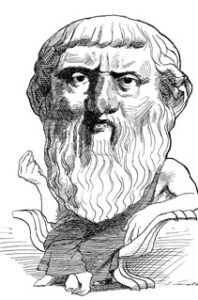Apologia Plato 017

Apología de Sócrates
Cuerpo de la defensa que de sí y de su misión social hace Sócrates
(28d-29a)
Tabla de contenidos
Ἀπολογία Σωκράτους 017
ἐγὼ οὖν δεινὰ ἂν εἴην εἰργασμένος, ὦ ἄνδρες [28e] Ἀθηναῖοι, εἰ ὅτε μέν με οἱ ἄρχοντες ἔταττον, οὓς ὑμεῖς εἵλεσθε ἄρχειν μου, καὶ ἐν Ποτειδαίᾳ καὶ ἐν Ἀμφιπόλει καὶ ἐπὶ Δηλίῳ, τότε μὲν οὗ ἐκεῖνοι ἔταττον ἔμενον ὥσπερ καὶ ἄλλος τις καὶ ἐκινδύνευον ἀποθανεῖν, τοῦ δὲ θεοῦ τάττοντος, ὡς ἐγὼ ᾠήθην τε καὶ ὑπέλαβον, φιλοσοφοῦντά με δεῖν ζῆν καὶ ἐξετάζοντα ἐμαυτὸν καὶ τοὺς ἄλλους, ἐνταῦθα δὲ φοβηθεὶς ἢ θάνατον [29a] ἣ ἄλλ᾽ ὁτιοῦν πρᾶγμα λίποιμι τὴν τάξιν. δεινόν τἂν εἴη, καὶ ὡς ἀληθῶς τότ᾽ ἄν με δικαίως εἰσάγοι τις εἰς δικαστήριον, ὅτι οὐ νομίζω θεοὺς εἶναι ἀπειθῶν τῇ μαντείᾳ καὶ δεδιὼς θάνατον καὶ οἰόμενος σοφὸς εἶναι οὐκ ὤν. τὸ γάρ τοι θάνατον δεδιέναι, ὦ ἄνδρες, οὐδὲν ἄλλο ἐστὶν ἢ δοκεῖν σοφὸν εἶναι μὴ ὄντα: δοκεῖν γὰρ εἰδέναι ἐστὶν ἃ οὐκ οἶδεν. οἶδε μὲν γὰρ οὐδεὶς τὸν θάνατον οὐδ᾽ εἰ τυγχάνει τῷ ἀνθρώπῳ πάντων μέγιστον ὂν τῶν ἀγαθῶν, δεδίασι δ᾽ ὡς εὖ εἰδότες [29b] ὅτι μέγιστον τῶν κακῶν ἐστι.
Perge ad initium paginae huius
Apologia Sōcratis 017
Según esto, Varones atenienses, obrara espantablemente mal [28e] si al ordenarme los jefes que vosotros elegisteis para que me mandaran en Potidea, en Anfípolis y en Delion, no me hubiera quedado firme en el puesto señalado, como uno de tantos, corriendo el común peligro de muerte; en cambio, al ordenarme el Dios, como yo supongo y tengo para mí, que debo vivir dado a filosofar y a ejercitarme a mí mismo y a los demás, entonces precisamente abandonara mi puesto, [29a] por miedo a la muerte o por otro motivo cualquiera.
Espantablemente malo fuera, por cierto; y en este caso si que se me trajera con justo motivo y con verdad ante el tribunal, por no creer se den Dioses, ya que desobedezco al oráculo, temo a la muerte, y me tengo por sabio sin serlo. Que temer a la muerte, Varones, no es otra cosa sino tenerse por sabio, pues es pensar saber lo que uno no sabe. Que nadie de cierto sabe ni siquiera si es para el hombre la muerte el mayor de los bienes; y, con todo, la temen como si supieran de buen saber que es el mayor de los males.
Perge ad initium paginae huius
Apology of Socrates 017
So I should have done a terrible thing, [28e] if, when the commanders whom you chose to command me stationed me, both at Potidaea and at Amphipolis and at Delium, I remained where they stationed me, like anybody else, and ran the risk of death, but when the god gave me a station, as I believed and understood, with orders to spend my life in philosophy and in examining myself and others, [29a] then I were to desert my post through fear of death or anything else whatsoever.
It would be a terrible thing, and truly one might then justly hale me into court, on the charge that I do not believe that there are gods, since I disobey the oracle and fear death and think I am wise when I am not. For to fear death, gentlemen, is nothing else than to think one is wise when one is not; for it is thinking one knows what one does not know. For no one knows whether death be not even the greatest of all blessings to man, but they fear it as if they knew that it is the greatest of evils.
Perge ad initium paginae huius
Conversaciones en el Ātrium Philosophicum
EN CONSTRVCCION

EN CONSTRVCCION
Perge ad initium paginae huius
OFFICĪNA PHILOSOPHŌRVM ***
